Kick-off CESICT
Kick-off CESICT 26. September 2022
Scandic Lerkendal from 09:00 – 12:30
Programme
09:00-09:10
Welcome: The importance of sustainable ICT – Ingrid Schjølberg, Dean IE-faculty
09:10-09:30
CESICT – Center for Sustainable ICT– John Krogstie, Director NTNU Digital
09:30-10:10
Presentation of ongoing research and initiatives
Birgit Penzenstadler, Chalmers University of Technology
A Decade of International Research on Sustainability from a Requirements Engineering Perspective
As one of the first to coin the term Software Engineering for Sustainability, Birgit Penzenstadler has been exploring the topic of sustainability from the point of view of software engineering since 2011. Many questions are relevant from early requirements engineering onward - the talk is structured along the following ones:
- Identification: Where and why is sustainability relevant in a specific software system?
- Support: How can requirements engineers and designers support sustainability objectives from inception?
- Analysis: How can sustainability aspects be identified if many software engineers do not have specific education on the topic?
- Furthering: How does the wellbeing and resilience of software engineers impact their dedication to sustainability?
Babak A. Farshchian (IE Faculty/ IDI) and Karen Walseth Hara (MH Faculty/ ISM)
Sustainable digital transformations
We will represent a newly-funded multidisciplinary project at NTNU with the goal of investigating the properties of several classes of technologies (e.g. platforms, autonomous algorithms, sensors) in the context of sustainable development. In this talk we will present our ideas and plans related to digital transformations and sustainability. Our project is based on several real-word cases from domains such as healthcare, social services, and built environments. We will present some of these cases and how we plan to generate new knowledge through the cases.
Break
10:20-11:05
Social dilemmas for AI developers
This presentation discusses the role played by collective action problems in sustainable development of AI systems? The social dilemma for AI developers is defined and described, and a possible solution is presented. The importance of understanding systems in order to ensure their sustainability is highlighted, and the role of explainable AI (XAI) briefly discussed in this context.
Sobah Abbas Petersen (IE Faculty/ IDI), Elham Andalib, PhD candidate (IV Faculty/IBM) and Grace Katharine Forster PhD candidate (MH faculty/ INB)
Sustainable Built Environments for better Health and WELL-being – SWELL
This presentation will introduce the motivations and objective behind the SWELL project. The SWELL project’s entry point for a sustainable transformation is the health and well-being of the population, related to the urban development and the built environment. The role of digital technologies at this intersection is pivotal to achieving systemic change. We will present the objectives of the SWELL project and the multi-disciplinary perspectives and how we will work towards sustainable transitions using ICT.
Magnus Jahre (IE Faculty/ IDI)
Developments in energy efficient computing systems - EECS
The presentation will explain how ubiquitous computer systems have become and that any use of a computer system consumes energy. The net effect is that ICT now accounts for ~10% of the global consumption of electrical energy. It is hence critical that developers write energy efficient applications, and I will present two recent contributions from NTNU’s Energy Efficient Computing Systems (EECS) that helps developers achieve this ambition.
11:05-11:15
Expectations to CESICT from our collaborators: Short presentations from our partners in GoForIT
11:15-11:30
The way ahead: John Krogstie, Director NTNU Digital
11:30-12:30
Lunch




